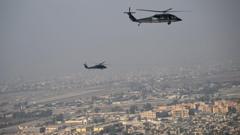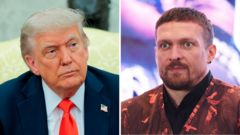U.S. military presence in Los Angeles amid immigration protest sparks debate over legality and necessity.
US Troops Respond to Protests in Los Angeles: A Controversial Military Deployment

US Troops Respond to Protests in Los Angeles: A Controversial Military Deployment
The deployment of National Guard and Marines in response to protests raises constitutional concerns.
In a rare move, approximately 4,700 military personnel, including 4,000 National Guard members and 700 Marines, have been deployed to Los Angeles in response to protests linked to immigration raids. This action, initiated by President Trump, is viewed as stretching the limits of presidential authority regarding the use of military forces on domestic soil. The deployment has met with opposition from California officials, including Governor Gavin Newsom, who described the military's involvement as an overreach and called for a court to restrict their use to safeguarding federal properties.
President Trump has defended the troop mobilization, arguing that it is essential for maintaining order in the city, stating, “If we didn’t get involved, right now Los Angeles would be burning.” Coverage from reporters on the ground highlights a lack of widespread unrest, suggesting that protests are concentrated in specific areas around federal buildings rather than affecting the city extensively. This raises questions regarding the justification for invoking military intervention.
Experts, such as Pentagon correspondent Helene Cooper, emphasize the historical context of deploying military forces within U.S. borders, noting that while National Guard troops may assist local authorities during crises, such deployments typically occur with state governor’s consent. Additionally, she mentioned the Insurrection Act as a legal pathway for armed forces to intervene domestically; however, the current protests do not appear to meet the criteria for such action. Observations from correspondent Jesus Jiménez corroborate that unrest is not as pervasive as the military's response may suggest, further fueling the ongoing debate over the appropriateness of these measures.
President Trump has defended the troop mobilization, arguing that it is essential for maintaining order in the city, stating, “If we didn’t get involved, right now Los Angeles would be burning.” Coverage from reporters on the ground highlights a lack of widespread unrest, suggesting that protests are concentrated in specific areas around federal buildings rather than affecting the city extensively. This raises questions regarding the justification for invoking military intervention.
Experts, such as Pentagon correspondent Helene Cooper, emphasize the historical context of deploying military forces within U.S. borders, noting that while National Guard troops may assist local authorities during crises, such deployments typically occur with state governor’s consent. Additionally, she mentioned the Insurrection Act as a legal pathway for armed forces to intervene domestically; however, the current protests do not appear to meet the criteria for such action. Observations from correspondent Jesus Jiménez corroborate that unrest is not as pervasive as the military's response may suggest, further fueling the ongoing debate over the appropriateness of these measures.






















